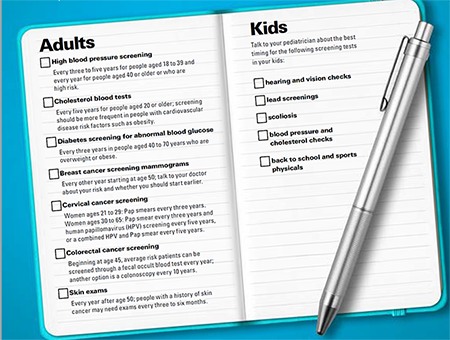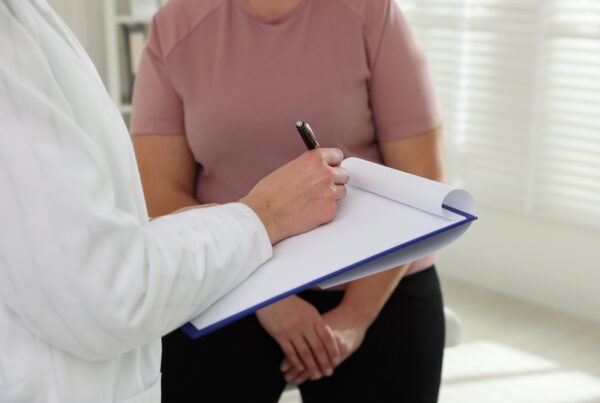It can sometimes feel strange to make a doctor’s appointment when you’re not feeling sick. But the best way to maintain your wellness is through regular screening checkups with your primary care provider, which can help detect — and even prevent — certain medical conditions.
Use these helpful checklists to make the appropriate appointments for everyone in your family.
Kids
Talk to your pediatrician about the best timing for the following screening tests in your kids:
- hearing and vision checks
- lead screenings
- scoliosis
- blood pressure and cholesterol checks
- back to school and sports physicals
Adults and Seniors
High blood pressure screening
Every three to five years for people aged 18 to 39 and every year for people aged 40 or older or who are high risk.
Cholesterol blood tests
Every five years for people aged 20 or older; screening should be more frequent in people with cardiovascular disease risk factors such as obesity.
Diabetes screening for abnormal blood glucose
Every three years in people aged 40 to 70 years who are overweight or obese.
Breast cancer screening mammograms
Every other year starting at age 40; talk to your doctor about your risk and whether you should start earlier. Women with an average risk of breast cancer should be screened every two years until the age of 75.
Cervical cancer screening
Women ages 21 to 29: Pap smears every three years.
Women ages 30 to 65: Pap smear every three years and human papillomavirus (HPV) screening every five years, or a combined HPV and Pap smear every five years.
Colorectal cancer screening
Beginning at age 45, average risk patients can be screened through a fecal occult blood test every year; another option is a colonoscopy every 10 years. After age 75, a colonoscopy may no longer be recommended.
Prostate cancer screening for men
Beginning at age 45, your healthcare provider may order a PSA (prostate cancer screening) blood test.
Skin exams
A head-to-toe screening for skin cancer should be done every year; people with a history of skin cancer may need exams every three to six months.
Osteoporosis screenings for bone density
At age 65, women should get a dual-energy X-ray absorptiometry (DEXA) scan; men should talk to their doctors about screening.
Screenings for People with Diabetes
If you have diabetes, talk to your doctor about the following screening tests:
- A1C blood tests, which gives the doctor an idea of blood sugar levels over the last two to three months
- Frequent blood pressure checks
- Eye health screenings
- Foot exams
Appointments
See your primary care provider to find out if you are up to date on preventative screenings. Call 216-My-Metro (216-696-3876) to schedule an appointment or visit metrohealth.org/appointments. In person and virtual care options are available.











